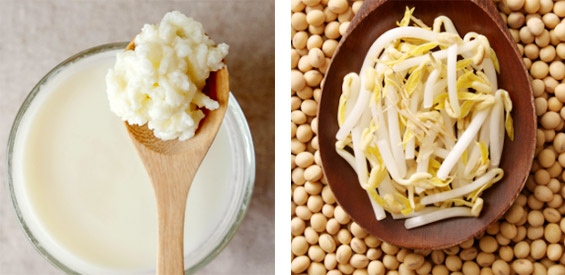Improve your immune system
How can we improve our immune system?
Inside your intestines is a large organ called the “intestinal microbiome”. It is a sensitive organ, made up of billions of microorganisms, actively working to maintain your health and well-being. One of the most important functions of the intestinal microbiome is to work closely with your immune system and therefore it is a good idea to consider how to treat your intestinal microbiome optimally, in order to strengthen the immune system.
Take good care of your gut microbiome
When the intestinal microbiome’s content of microorganisms is in normal balance, which in a fine word is called eubiosis, your body has a good ability to protect itself from external influences.
This is why you can strengthen your immune system by taking good care of your gut microbiome . The key to achieving and maintaining this state lies in both our eating habits and our general lifestyle. The following is good advice on which diet and supplements contain the most important things that the intestinal microbiome must have in order to maintain the fine balance.
Besides vitamins, it is first and foremost prebiotics and probiotics that you need to go for. Although they almost sound the same, they are completely different. You can read about the difference below.
PROBIOTICS AND PREBIOTICS – WHAT’S THE DIFFERENCE?
What are probiotics?
Probiotics are i.a. lactic acid bacteria which are also found in the intestine.
What are prebiotics?
Prebiotics are non-digestible fibers that stimulate the growth of beneficial bacteria in the digestive system.
Go for prebiotics
Prebiotics are a type of fiber that is essential for your intestinal system because they help feed the benign bacteria found in your microbiome. It is also what you may have most often heard referred to as intestinal flora. It is important that these bacteria are fed so that they can be strong and work optimally. Prebiotics are easy to find in normal natural foods, but are also available as supplements.
Foods that contain prebiotics:
• Vegetables: Artichoke, asparagus, beetroot, broccoli, eggplant, leek or mushrooms
• Fruits: Banana, apple, pear, plum, citrus fruits, tomato, plum and sharon fruit
• Whole grains: Oats, rye, barley and spelled
• Legumes: Lentils, chickpeas, split peas, soybeans or dried beans
• Oilseeds: Walnuts, hazelnuts, sunflower and squash seeds
• Spices: Cinnamon, ginger, black pepper or oregano.
Supplement with probiotics
Probiotics are i.a. lactic acid bacteria , which are similar to those found naturally in the intestine. Lactic acid bacteria convert carbohydrates into lactic acid, which is important because it stimulates the development of beneficial microorganisms, or bacteria, in the gut. They also help to ensure that harmful bacteria in the stomach and intestines are weakened. It is therefore a good idea to make sure to get probiotics as part of the daily diet. You can also supplement by eating supplements with probiotics.
Foods that contain probiotics:
• Yogurt
• Fermented milk
• Kefir
• Soy derivatives
• Sauerkraut
Do not forget your vitamins
Your immune system also needs antioxidant vitamins such as vitamins C and D. They are essential for your immune system to function optimally.

Vitamin C
Vitamin C helps to stimulate the cells that inhibit disease-causing bacteria. They also help create proteins that the body needs to form tissues and whole wounds. Unlike most animals, humans are not even able to form vitamin C and therefore it is important to get through the diet.
Foods that are especially rich in vitamin C:
• Fresh parsley
• Citrus fruits
• Blackcurrants
• Kiwi
• Spring salad
D vitamin
Vitamin D helps the body absorb calcium from the intestines, maintain normal bones and teeth and strengthen your immune system. You can get vitamin D through the diet, which, however, will only cover approx. 20% of your need, but the body also forms vitamin D in the skin when exposed to sunlight. Because we in Denmark have limited amounts of sunlight during the winter, the Danish Health and Medicines Authority recommends that you eat a supplement of vitamin D from October to April.
Foods that contain vitamin D:
• Fatty fish (sardines, salmon, herring, mackerel and tuna)
• Eggs
• Cod liver oil
• Butter (less content)
• Meat (less content)
• Milk (less content)
• Cheese (however less content)
When do you need to pay extra attention?
Because your gut microbiome is such an important part of your immune system, it’s always important to pamper it through diet and any supplements and vitamins. But it is also important to know the times when it is good to give it extra attention.
Times for extra attention:
• When your diet is unbalanced (less than 5 fruits and vegetables a day)
• When you have been ill (two infectious episodes during the winter)
• When you have taken antibiotics
• When you are rarely out in the sun
Sources
• Microbiota and intestinal immune system, The basic elements of digestive pathology, CDU-HGE / Editions Elesevier Masson – October 2014. • Zheng D, Liwinski T, Elinav E. Interaction between microbiota and immune system in health and disease. Cell res. 2020; 30 (6): 492-506. • Piqué Nielsen, Berlanga M, Miñana-Galbis D. Health Benefits of Heat-Killed (Tyndallized) Probiotics: An Overview. Int J Mol Sci. 2019 May 23; 20 (10): 2534.
Share this content


